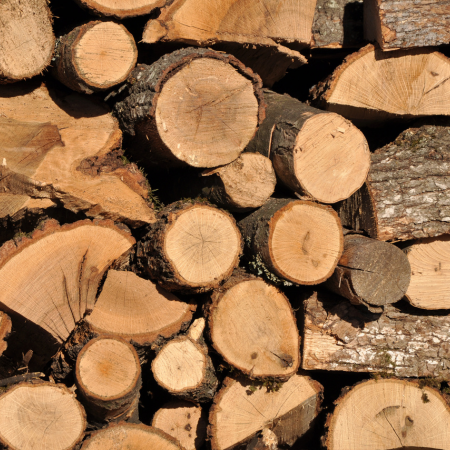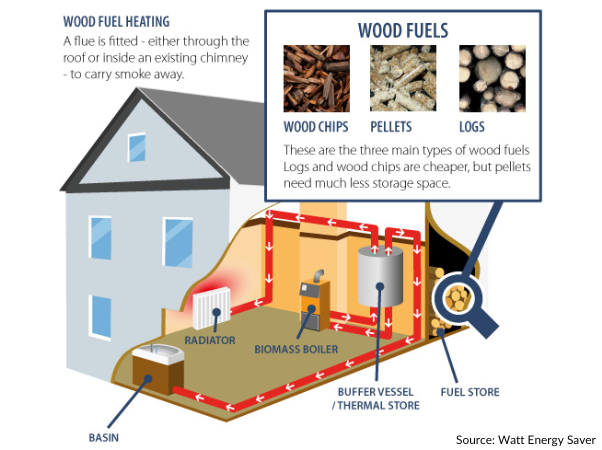Biomass Homeowner Guide
What is Biomass?
‘Biomass’ refers to fuel from a renewable source, which can be used to heat your home via a biomass boiler or biomass heating system.
Energy is generated from burning renewable fuels - such as wood, plants, manure, or in some cases, household waste. Most commonly, biomass boilers run on dense wood pellets, logs, or wood chips to provide energy and warmth.

A biomass boiler works by burning biomass, then transferring the heat generated to a connected central heating and hot water system to create warmth for the whole house.
Are Biomass Boilers environmentally friendly?
Whilst biomass does release some carbon dioxide when burned, it’s considerably less than fossil fuels - making biomass a great eco-friendly alternative to traditional heating systems. If you replace a coal fired boiler with a biomass boiler, you can save around 12 tonnes of carbon dioxide emissions each year.
The biomass itself can be regrown sustainably, as long as new trees and plants are replanted after existing trees are harvested. If the biomass fuel is harvested locally, carbon emissions are reduced even further.
How much money will I save with Biomass?
The price of wood and other fuel does vary, however it’s highly unlikely to ever cost more than traditional heating options.
In fact, it is estimated that a wood-fuelled biomass boiler can save £1,100 per year compared to a dated electric heating system (based on average annual usage in an average 3-bedroom property).
How much does a Biomass Boiler cost?
Biomass boilers do require a fairly high initial investment. Including installation, an automatically fed biomass boiler will cost around £15,000.
In terms of fuel, prices vary - however you can expect to spend far less than you would on traditional heating systems. There are a few money-saving tips you can utilise to help keep biomass fuel costs down:
- Buy pellets / chips in bulk - if you have the space, chips and pellets can be delivered in bulk to keep overall costs down. This will likely save a few hundred pounds each year compared to not buying in bulk.
- Buy unseasoned logs - ready-to-burn logs can be bought from local wood suppliers, however you can save money by buying unseasoned logs and letting them season for a year or so before use. Again, this requires a fairly large amount of space for log storage.
How long does a Biomass Boiler last?
Quality biomass boilers are extremely reliable and well-engineered. They are designed to last for over 20 years - considerably longer than many other heating systems.

How reliable are Biomass Boilers?
With regular maintenance, biomass boilers are less likely to break than many traditional heating systems.
Biomass boilers do create ash, however the amount of ash created by pellets and chips is less than one percent of the fuel volume - meaning it only needs to be swept weekly. Log fuelled systems must be swept and cleaned more regularly to ensure proper maintenance.
Some biomass boilers have self-cleaning mechanisms, which automatically removes ash and sweeps the heat exchanger - meaning even less maintenance is required to ensure a reliable biomass boiler.
Can existing heating systems be used with Biomass Boilers?
Yes. Biomass boilers connect to any standard domestic heating system, meaning a complete heating system overhaul is not required if you plan on switching to biomass.
Do I need a hot water cylinder for a Biomass Boiler?
Yes. Biomass boilers are designed to work in tandem with a hot water cylinder, making them a requirement for biomass boiler installations.
Which Biomass fuel is best?
The three main types of biomass used for fuel are chips, logs, and pellets.
- Wooden chips are commonly used to heat large buildings, including halls and groups of houses.
- Logs are placed into the biomass boiler by hand, and require far more manual input from the owner - however logs can be the cheapest option for biomass if you have a plentiful local supply.
- Pellets are the most common fuel for normal homes with biomass heating. Their density makes them highly efficient and more controllable than other types of biomass.
Both chips and pellets can be placed into automatic fuel feeders, which refill the biomass boiler automatically on timed intervals or as required.. This makes biomass boilers run very similarly to traditional boilers, with minimal user input needed.

Is a Biomass Boiler worth it?
For homeowners in rural areas keen to create a renewable-compatible, energy-efficient home - biomass boilers can be an excellent option. They pair well with other low-carbon solutions and provide homeowners with a great deal of control over their home heating and energy usage.



